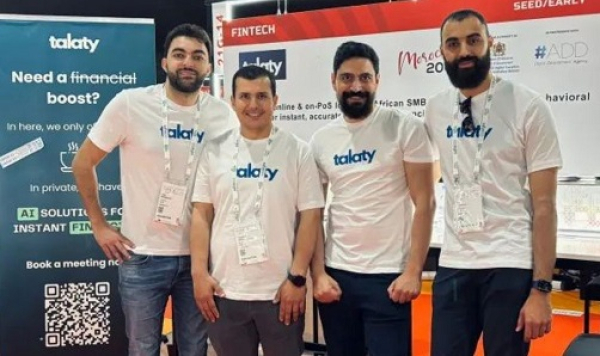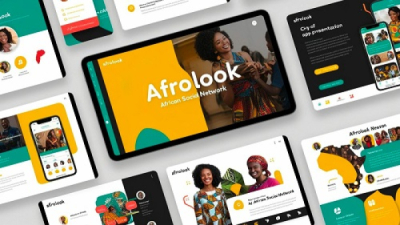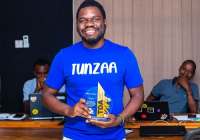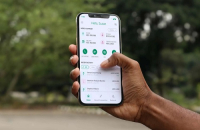
Solutions (583)
Financial inclusion in Africa still has a long way to go. In recent years, fintech startups have been offering solutions that are better suited to the daily lives of the continent's populations.
CLIKPAY Money is a neobank established by a Gabonese startup, offering mobile payment and money transfer services to both individuals and businesses. Founded in 2020 by Mark Doumba, the startup operates from headquarters in Libreville, Gabon, and Dubai, United Arab Emirates.
The CLIKPAY solution includes a mobile app available on both iOS and Android platforms, with over 10,000 downloads according to Play Store’s data. Users can create an account by providing personal information, which grants access to various CLIKPAY features.
Key features of the app include real-time fund transfers with alerts, QR code scanning for merchant payments, purchasing airtime and internet bundles from multiple telecom operators, and access to a network of agent points across Gabon's nine provinces for convenient cash deposits and withdrawals.
For businesses, CLIKPAY offers the CLIKPAY Business service. This allows companies to manage payroll, pay suppliers, generate transaction reports, evaluate performance, handle invoicing, and perform accounting tasks via the mobile or web application.
According to CLIKPAY, every transaction is encrypted and protected by a personal code (Mpin), with robust fraud detection systems in place to safeguard user security.
By Adoni Conrad Quenum,
Editing by Feriol Bewa
Many small and medium-sized businesses (SMBs) in Africa face difficulty obtaining funding from traditional banks. To overcome this obstacle, a group of tech entrepreneurs in Morocco has created an innovative solution.
Talaty, a Moroccan fintech start-up founded in 2022 by Soulaimane Lahrech, Simo Bernoussi, Ilyas Oudghiri, and Zakaria E., is leveraging artificial intelligence (AI) to address the financial challenges faced by small and medium-sized enterprises (SMEs). By analyzing SME data, the company determines creditworthiness even for businesses with limited financial records.
Through advanced AI technologies and behavioral finance analytics, Talaty aims to optimize credit assessments, cutting operational costs and default rates by up to 90%. This innovative approach seeks to improve SMEs' access to financing while equipping financial institutions with effective tools for risk management and operational efficiency.
In December 2024, Talaty secured undisclosed funding to bolster its presence in Morocco and explore expansion into neighboring markets. "Securing financing remains a major obstacle for SMEs, accounting for 40% of bankruptcies caused by payment defaults. Our AI-powered platform simplifies this process, enabling partner institutions to provide effective and rapid financial support," said Soulaimane Lahrech.
Despite their critical role in the African economy, SMEs continue to face significant hurdles in obtaining the funding required for growth. According to Didier Acouetey of AfricSearch, a South African HR consulting firm, as reported by Forbes Afrique, "Africa has over 100 million SMEs needing $350 billion annually for development, yet they secure barely 20% of this amount."
By Adoni Conrad Quenum,
Editing by Feriol Bewa
BNPL (Buy Now, Pay Later) is a financing option that allows consumers to purchase goods or services and pay for them over time, usually with no interest if payments are made on schedule. In Senegal, a startup is offering a similar solution.
Nixacom is an online shopping platform developed by a Senegalese startup. It allows customers to purchase tech gadgets through a BNPL (Buy Now, Pay Later) system. Founded in 2023 by Cheikh Gueye, Elhadji Fall, and Wangel Yohannes, the platform offers a convenient way to access technology products.
Users can browse Nixacom’s web platform to access a wide range of products, including smartphones, tablets, and computers. "A customer logs onto our website and picks which product they are looking for, fill out a KYC, and once we receive all the information we see which of our partner institutions they are eligible with and get them financed directly through us, and get them their product," Cheikh Gueye told Disrupt Africa explaining the application process.
Nixacom works with various financial institutions, offering payment plans of 12 or 24 months based on the user’s income and the selected product. During the process, the startup requires documents such as an ID and proof of income.
However, it does not conduct a credit check when assessing the user’s eligibility. Application processing times range from 5 to 10 business days. "After approval, your product will be prepared for local pickup within 5 to 10 business days, and you will receive a notification when your order is ready for collection," Nixacom explained.
By Adoni Conrad Quenum,
Editing by Feriol Bewa
Podcasts have exploded in popularity worldwide in recent years. Two tech entrepreneurs are launching a platform that offers audio content specifically tailored for African audiences.
Genti Media is a Nigerian platform dedicated to promoting African stories. It offers tales, dramas, and educational materials narrated in African languages by African voices. Founded in 2021 by Ojiugo Uche and Ekemezie Uche, the Lagos-based startup aims to preserve and elevate the continent’s rich storytelling traditions.
The mobile application, available on iOS and Android, has already been downloaded over 10,000 times on the Play Store. Users can create an account using their email, Google, or Facebook credentials to access Genti Media's catalog. The platform boasts over 15,000 hours of African audio stories, educational content, radio plays, and sermons, all available in more than 20 African languages.
An "Explore Now" button allows users to try the platform without creating an account. However, account creation becomes mandatory for continued listening. Genti Media offers a tiered access model, with some titles available for free and others requiring users to watch ads or purchase a coin bundle to unlock.
“Several titles are free on the app. Also, trailers and one or two episodes of paid content are free so you can check a title out. Once you have confirmed you like the content and want to listen to more, you can unlock content either by watching ads (no payment necessary) or unlock by buying a coin bundle. You have multiple options,” explains the startup.
Genti Media compensates its creators, a policy that has attracted numerous Nigerian storytellers, particularly those speaking the country’s major languages, such as Igbo, Hausa, and Yoruba.
Adoni Conrad Quenum
The streaming market is dominated by American giants like Netflix, HBO, and Amazon Prime Video. In Senegal, Modou Lolly Sarr wants to create a solution of similar scale.
Wawaw is a digital platform offering streaming access to African cinematic content. Founded in Dakar in 2024 by Modou Lolly Sarr, the startup received a grant of XOF 7 million (approximately $11,000 USD) from Senegal's General Delegation for Women and Youth Entrepreneurship to support its growth.
“Becoming the leading streaming platform for African films, showcasing the best of African cinema, and enabling African filmmakers to share their stories with the world” is the startup's ambitious goal.
While Wawaw has yet to launch a mobile application, users can access its catalog of films by creating an account directly on the web platform. The library currently features a mix of Hollywood blockbusters and Senegalese and African productions. In 2024, the company actively pursued partnerships with African producers to better promote their work.
Beyond streaming, Wawaw aims to expand into film project booking and management and the modernization of production processes. To support this, the company plans to train 500 young cinema enthusiasts in collaboration with the Yennenga Center, teaching them the basics of production and how to use modern tools.
The startup also plans to invest in new equipment and eventually produce its own films, following in the footsteps of major platforms like Netflix, Crunchyroll, and AppleTV. For 2025, Wawaw intends to roll out an Android mobile app and enhance its web platform to improve user experience.
Adoni Conrad Quenum
In recent years, several African social networks, including Ushahidi, Blueworld, and Eskimi, have emerged with varying degrees of success. In Togo, Bienvenu Fanagnon has developed a social network designed to highlight the continent's talent and rich cultural heritage.
Afrolook is a social network developed by a Togolese startup based in Lomé. It allows users to capture unique moments through photos and videos and communicate via messages. Launched in 2024 by Bienvenu Fanagnon, the platform aims to bring African culture to the forefront.
“Afrolook is an African social network developed by a group of students, built on AI models called XILO and inspired by African culture. [...] We aim to create an engaging and authentic experience to promote African culture on a global scale,” explains Fanagnon.
Currently available only on Android, Afrolook has already been downloaded over 100 times, according to Play Store data. Users must create an account to access its features. One notable tool is the conversational agent XILO, which engages users in discussions on various topics for entertainment. However, it’s worth noting that the platform is still in its testing phase.
The network integrates many familiar concepts from platforms like Facebook and Instagram. Users can post diverse content—photos, videos, or text—to express their creativity and share ideas on various topics. They can also discover inspiring content created by African users worldwide or follow others to stay updated on their shared posts.
Afrolook also fosters community interaction by enabling users to like, comment on, or share posts. Additionally, the startup has introduced a monetization program to reward the platform’s most impactful content creators.
Adoni Conrad Quenum
Launched by two tech entrepreneurs, the financing solution aims to support the growth of small and medium-sized enterprises in Egypt. It recently received backing from the Egyptian Financial Regulatory Authority.
Oliv is an Egyptian digital platform that offers factoring services to small and medium-sized enterprises (SMEs). It allows businesses to instantly convert invoices into cash. Based in Cairo, the startup was founded in 2024 by Ziad Mokhtar and Hatem M. Sabry.
“Our goal is to help thousands of small businesses secure short-term financing to maintain smooth operations and support growth. We rely on technology to extract and analyze data and make financing decisions in just a few minutes.”
For the time being, Oliv can be accessed only accessed through its website, where users create accounts. Based on registration information, the fintech assigns a credit limit to the business.
To be eligible for financing, businesses must provide B2B services and have an electronic invoice history exceeding one year. Eligible invoices can then be selected for factoring, with discount rates reviewed and a digital contract signed with Oliv. Funds are deposited into the business's bank account within 48 hours.
The platform offers up to 4 million Egyptian pounds (approximately USD 79,000) and payment terms are 30, 45, or 60 days on a renewable basis.
Adoni Conrad Quenum
Since the COVID-19 pandemic, e-commerce has experienced significant growth across Africa. In Tanzania, Ng'winula Kingamkono has developed a solution to fuel this expansion.
Tunzaa is a Tanzanian fintech platform that combines a marketplace with payment solutions. Founded in 2020 by Ng'winula Kingamkono, the Dar es Salaam-based company connects businesses with a network of buyers who can utilize installment payment plans to purchase a variety of goods and services. It recently secured an undisclosed funding round to fuel its growth
The Tunzaa mobile app, available on both iOS and Android, has been downloaded over 10,000 times, according to Play Store data. The app features a wide range of products, thanks to partnerships with major international brands that offer exclusive deals.
After a purchase, users have multiple payment options, including bank cards, mobile money (notably M-Pesa), and payments via Tunzaa's digital wallet. Upon completing a transaction, the platform sends the user a message or email, followed by a phone call to arrange delivery details.
For those who prefer not to opt for delivery, orders can be picked up directly from the seller or Tunzaa's customer service center. Regarding installment payments, users only receive their purchases after the full amount has been paid.
Adoni Conrad Quenum
To assist victims of violence, especially women and children, an NGO has developed a mobile application with a range of tools to combat this issue.
Zonza/Loba, a mobile application launched on Tuesday, November 25, 2024, by the Congolese NGO Azur Développement, aims to mark the International Day for the Elimination of Violence Against Women. Available in French, Lingala, and Kituba, the app is designed to raise awareness about the various forms, manifestations, and consequences of gender-based violence.
“This initiative directly addresses the numerous requests for support we receive from women and girls who have survived violence. These requests often come through our one-stop assistance centers run by Azur Développement, primarily via email. We also consistently receive requests to organize awareness campaigns to prevent violence against women and children,” explained Sylvie Niombo, Director of Azur Développement.
The app, available exclusively on Android, offers several sections that provide information on gender-based violence, available resources, and guidance on how to respond in such cases. It helps users understand the necessary steps to take in response to violence and directs them to appropriate support services, such as one-stop assistance centers for women and children. In dangerous situations, Zonza/Loba includes an alert feature that allows users to quickly notify the police or their loved ones.
“The app also allows users to call the police or send predefined alert messages to close contacts. Additionally, it can be used to reach the one-stop assistance centers to request support for victims of violence or to report cases of violence against women and children,” added Sylvie Niombo.
Adoni Conrad Quenum
Designed by two tech entrepreneurs, the tailored solution aims to help small and medium-sized enterprises (SMEs) in Africa embrace the digital revolution. Since its launch, Leja claims its platform is used by over 1.4 million businesses.
Leja is a fintech solution that helps micro, small, and medium enterprises (MSMEs) digitize their management processes. It simplifies the shift from paper-based records to digital systems while promoting the adoption of financial services. Based in Nairobi, Kenya, the startup was founded in 2018 by Tekwane Mwendwa and Morgane Kablan.
"We’re proud to address the challenges MSMEs face, including limited access to affordable payment options and working capital financing. Many MSMEs previously relied on costly and inconvenient methods like cash, which impacted their operations," explains Tekwane Mwendwa.
Leja offers automated record-keeping, 360-degree payment solutions, and loans among its services. "We plan to expand our reach from 5% to 20% by partnering with financial institutions and NGOs to close the credit gap for MSMEs," he adds.
The platform also supports monetary transactions between users. Currently, only 10% of users utilize this function, but the fintech aims to increase this figure to 50%, unlocking significant transaction volumes and revenue potential in the process.
Leja operates exclusively through an Android mobile application. To access its services, a company representative must create an account by providing essential information such as their phone number, full name, national ID number, and email address.
Adoni Conrad Quenum
More...
Launched by five Zimbabwean tech entrepreneurs, the service streamlines bus ticket booking for users. The concept came to one of the founders while he was conducting business at a bus station.
Founded in 2017 by Vusumuzi Mkhwananzi, Josiah Mahachi, Millcent Mkhwananzi, Gift Chirinda, and Mandla Ncube, myRunner is a Zimbabwean tech startup with a mission to improve road transport services across Africa. Through its all-in-one web and mobile platforms, the company offers online ticket booking and real-time bus tracking. It also streamlines fleet management for transport companies.
"I grew up selling sweets and freezits in bus station [...] Everyday I saw challenges faced by passengers and bus operators ,passngers harrassed by touts , waiting long hours for buses and bus companies lossing a lot of revenue due to ineffective ticketing and bus managemet systems that where largely manual," explains Vusumuzi Mkhwananzi.
With myRunner, several processes are simplified. Registered travelers, for instance, can purchase tickets online from their chosen bus operator using various digital payment options. They can make selections based on their destination, travel date, and departure time, among other criteria.
Active in several African countries, including Botswana, South Africa, Zambia, Malawi, and Zimbabwe, the startup aims to revolutionize intercity transport in Africa by combining innovation and accessibility. It seeks to accelerate its growth by further developing its features to meet the growing demands of the market.
In July 2024, myRunner was selected alongside 41 other African startups to join the inaugural Timbuktoo Fintech Hub cohort. This initiative, launched by African nations in collaboration with the United Nations Development Programme (UNDP), aims to support the development of Africa’s tech ecosystem.
By Adoni Conrad Quenum,
Éditing by Feriol Bewa
To help companies find talent in African countries and their diasporas, and to assist job seekers in securing employment, Senegalese tech entrepreneur Kémo Touré has developed a tailored solution.
Wutiko is a web platform that helps Africans, including those in the diaspora, discover the best opportunities for jobs, funding, and events. It was developed by Kémo Touré’s agency, Wutiko Senegal SAS, which operates out of Dakar, as well as Lagos (Nigeria) and Ébène (Mauritius).
The digital solution uses artificial intelligence to match relevant profiles to specific search criteria. Users can apply for temporary opportunities or recruit job seekers. The platform also offers a range of services, including classified ad management, collaboration tools, and performance measurement solutions.
One notable feature is the Wutiko Wealth Index, which evaluates interactions within the platform's community. This initiative aims to address the needs of Africa’s job market while ensuring access to resources tailored to local and regional specificities.
“Wutiko is a platform designed to meet the needs of the job market in Senegal, Africa, and within the diaspora. Instead of carrying around a paper CV or reaching out to unverified companies, young people can enhance their visibility by creating a profile that will be seen by all companies on the platform. Likewise, businesses can recruit using well-structured, certified CVs,” explains Kémo Touré.
Adoni Conrad Quenum
To help people select the insurance policies that best suit their needs, Egyptian tech entrepreneurs have developed a comparison platform.
Amanleek is an online platform for comparing insurance offers, particularly in the automotive and health sectors. This digital solution was developed by an Egyptian startup based in Cairo, founded in 2019 by Ahmad Baracat, Ihab El Sokary, Mohab Aboueita, and Mohamed Mansour.
The startup collaborates with 18 insurance companies operating in Egypt. Its algorithm compares available offers to identify the best options. It has also integrated data and AI-driven insurance solutions to optimize its services according to users' needs. By digitizing the process of purchasing insurance policies and enabling the submission of required documents online, Amanleek has reduced the time needed from several weeks to just a few minutes.
Amanleek has established strategic partnerships with various companies, including players in telecommunications, Buy Now, Pay Later (BNPL) services, and payment networks, to facilitate financial transactions on its platform. Operating in over 20 governorates across Egypt, the platform claims more than 300 corporate clients. In July 2024, Amanleek was selected for the inaugural cohort of the Timbuktoo Fintech Hub.
The platform offers a mobile app available on iOS and Android. Users can create an account by entering their personal information and then providing the necessary details to allow the algorithm to suggest the best offers tailored to their needs.
Adoni Conrad Quenum
To help children and teenagers better understand various school concepts, a tech entrepreneur has launched an online learning platform that is revolutionizing education through innovative content.
Sikul, an online learning platform developed by a Gabonese startup, offers educational and entertaining content for children and teenagers. Founded by Lynda Hernandez Moibouey in September 2020, Sikul aims to make learning engaging and accessible.
Currently, Sikul is accessed through a web browser. Users create accounts with personal information to explore the platform's offerings, which include videos and digital books often developed in collaboration with educators.
The platform covers a range of subjects, including grammar, mathematics, conjugation, spelling, vocabulary, English, and local languages. "We teach children while entertaining them, helping them develop essential skills to become well-rounded adults," said Moibouey. "Our offerings include video DVDs like 'Ma maternelle en poche' (volume 1), 'Mon premier syllabaire' (volumes 1 and 2), 'L'écriture des mots,' 'Je sais conjuguer,' and a special word search DVD."
Regarding digital books, Moibouey highlighted titles such as "Mon super alphabet illustré," "L'abécédaire des animaux," "L'abécédaire des fruits et des légumes," and "Animal Alphabet."
Sikul currently boasts 161 active accounts, 77 videos, and 30 educational games. Access requires a subscription, starting at 7,000 CFA francs (approximately $11.20) per month for one parent and one child. A three-month subscription for one parent and two children costs 15,000 CFA francs, while an annual subscription for two parents and five children is 48,000 CFA francs
Adoni Conrad Quenum















